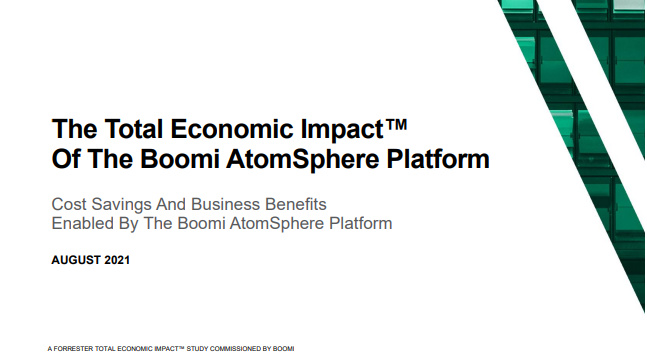AI agents are here to stay – and Boomi thinks it can be a market leader
Boomi World Tour had a heavy focus on how the company is orienting itself to take full advantage of the agentic future of AI, including a new registry to help businesses manage agents


AI agents are the talk of the town in the tech industry, with major players all rushing to show how their AI assistants can help your business become more efficient, and Boomi wants a slice of the action.
Amid some discussion of AI’s false promises and a wave of ‘AI-enhanced’ vaporware hitting the market, agents are essentially a way for organizations to get large language models (LLMs) to complete tasks autonomously. This could add real value to businesses and provide a far clearer path to ROI on AI investment.
Speaking onstage at Boomi World Tour 2024, Steve Lucas, CEO at Boomi, said he thinks AI agents reflect a turning point in the industry and will be a game-changer for enterprises.
Lucas argued that for the last 60 years, all software has been built on the if-then-else model, in which automated bots follow pre-defined paths. In contrast, agents have the ability to deviate from a hard-coded path based on contextual input and AI training.
For example, Lucas asked attendees to consider producing an expense report.
“If there were no exceptions to expense reports, then it would be easy,” Lucas said. “But there are always exceptions to expense reports: your meal costs too much, or why did that bottle of wine show up on the dinner order? Whatever it may be, we all have our good reasons for that bottle of wine, but the bottle of wine doesn’t fit the if-then-else mode.”
The power of AI agents, Lucas added, is that there is code wrapped around the model and bespoke grounding data that helps the system act according to the business’ best practices when confronted with an anomaly.
Sign up today and you will receive a free copy of our Future Focus 2025 report - the leading guidance on AI, cybersecurity and other IT challenges as per 700+ senior executives
“First of all, expense reports suck, they’re terrible, they’re not interesting. Second of all, it’s a complete waste of time for anybody to stare at it when you have an AI agent that goes, ‘Okay this expense report deviates from the norm, let me look at corporate policy, let me look at what we have and have not reviewed in the past, and I’ll decide on my own.’ That’s software reasoning.”
As such, Lucas confidently declared “The future is agentic” predicting that within two years enterprises will have thousands of discrete agents running around their organization.
Businesses want to implement AI agents soon and Boomi is ready to soak up demand
Lucas is not alone in this bullish stance. In an interview with Bloomberg Television at Dreamforce in San Francisco, Marc Benioff, CEO at Salesforce, announced he envisioned one billion AI agents in service by the end of fiscal year 2026.
A Capgemini report from July showed 82% of organizations intended on implementing AI agents in 1 – 3 years, for tasks like email generation, coding, and data analysis, and Boomi wants to capitalize on this anticipated demand.
Firstly, the firm has six AI agents already available on its platform, including Boomi Scribe for process documentation, a Boomi Answers chatbot, DesignGen for creating processes in environments like IFS and SAP, and DataDective for data traceability (available in early access).
Although Boomi initially said it would be charging for these tools, it reversed this decision in July. Speaking to ITPro, Lucas explained this move was motivated by getting users onto the platform and retaining them once they make the switch, which he thinks will offset any model licensing costs as adoption scales.
“What we see is our customers that use our agents have significantly more adoption of the Boomi platform as a whole. Imagine what that does for customer retention. So we believe that any cost we may incur through the use of agents, even expansively in our customer base, will be mitigated by the significant amount of customer success and adoption that we have at the end of the day.”
Boomi aims for centralised agent controls
Lucas said he understands businesses will want to use a multiplicity of agents from a number of different sources, and wants everyone to be part of the ‘agent economy’. As part of this, Boomi will host an agent marketplace where users can build and distribute their own agents.
But what Lucas said he was most excited about was Boomi’s upcoming AI agent registry solution, slated to become available in spring 2025, which will help businesses manage all of these autonomous systems.
Boomi has an API management solution that allows businesses to create, catalog, discover, and organize APIs in their organization, but Lucas noted that this solution does not exist for AI systems.
The upcoming agent registry will enable organizations to register and track agents as they go about their business within their corporate environment, allowing administrators to control the agents themselves and providing them with a kill switch in case agents do anything outside their remit.
RELATED WHITEPAPER

This could be particularly important as AI agents introduce new security challenges for businesses as they access a wide range of potentially sensitive systems across an organization’s corporate environment.
As agents proliferate organizations in their thousands, Boomi is betting on demand for a solution to keep track of exactly what they are doing, which systems they are accessing, and who is responsible for what task.
“The agent registry is going to be one of the most important pieces of software a company can own," said Lucas. "You have to have a way to govern and manage these [systems]. The agent registry will provide that and we are currently, as far as I know, the only company building this solution and we will have it in the market in the spring.”
It remains to be seen if the larger players in the AI space, such as Google, Amazon, and Microsoft who have all announced their own agents in recent months, will come out with their own solution for agent governance. For now, Boomi looks to have found a gap in the market and is pressing its advantage to drive the adoption of its flagship product.

Solomon Klappholz is a former staff writer for ITPro and ChannelPro. He has experience writing about the technologies that facilitate industrial manufacturing, which led to him developing a particular interest in cybersecurity, IT regulation, industrial infrastructure applications, and machine learning.
-
 What is Microsoft Maia?
What is Microsoft Maia?Explainer Microsoft's in-house chip is planned to a core aspect of Microsoft Copilot and future Azure AI offerings
-
 If Satya Nadella wants us to take AI seriously, let’s forget about mass adoption and start with a return on investment for those already using it
If Satya Nadella wants us to take AI seriously, let’s forget about mass adoption and start with a return on investment for those already using itOpinion If Satya Nadella wants us to take AI seriously, let's start with ROI for businesses
-
 The Total Economic Impact™ of the Boomi AtomSphere platform
The Total Economic Impact™ of the Boomi AtomSphere platformwhitepaper Discover the cost savings and business benefits enabled by the Boomi AtomSphere platform in this study by Forrester Consulting
-
 Five must-have capabilities in a modern iPaaS
Five must-have capabilities in a modern iPaaSwhitepaper Download this guide from Boomi to learn about the five modern iPaaS must-haves
-
 The four pillars of excellence for technology leaders
The four pillars of excellence for technology leaderswhitepaper Download this CIOs business case for integration and automation